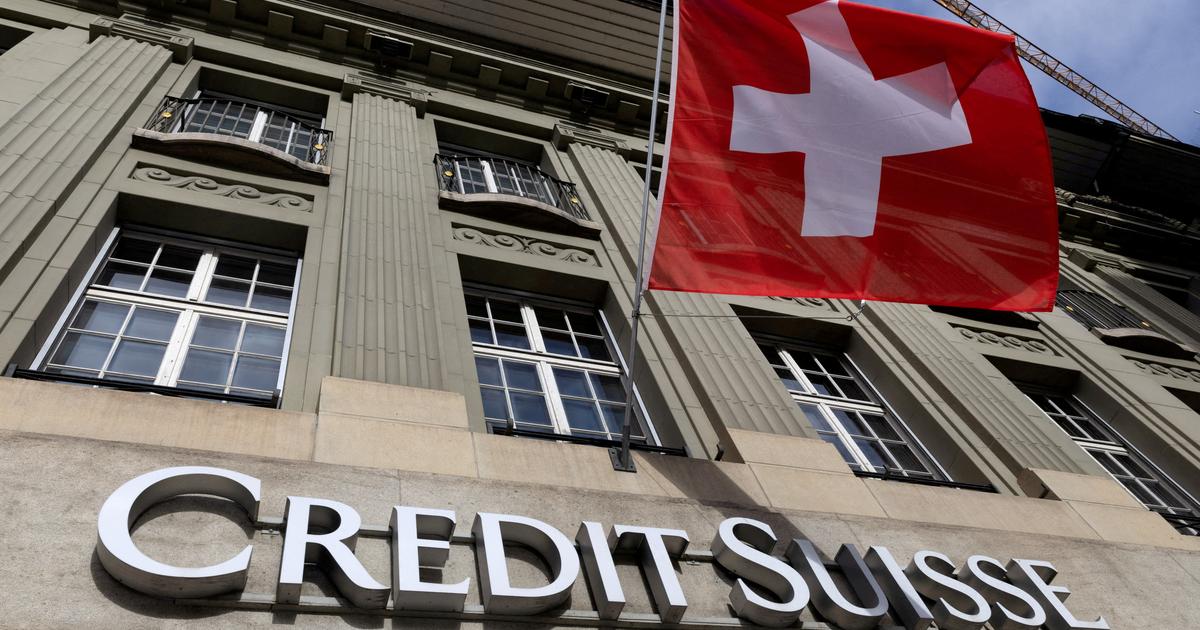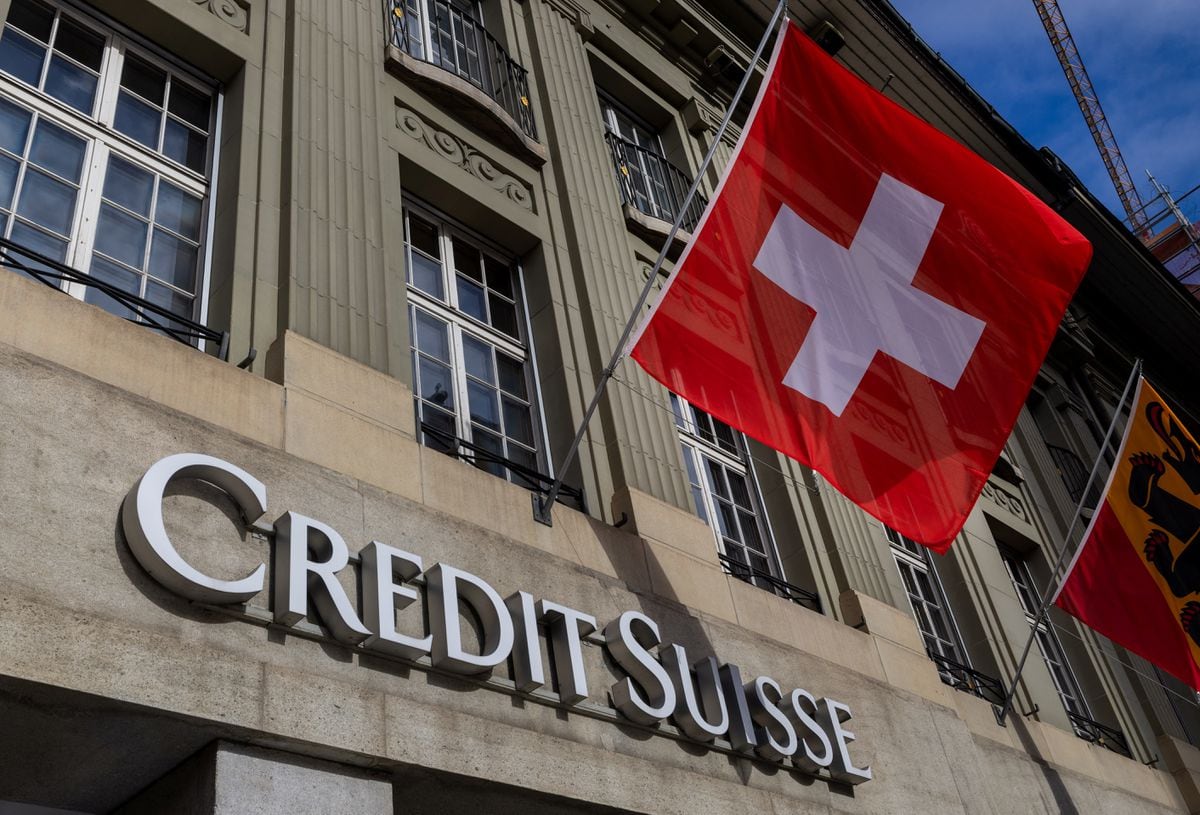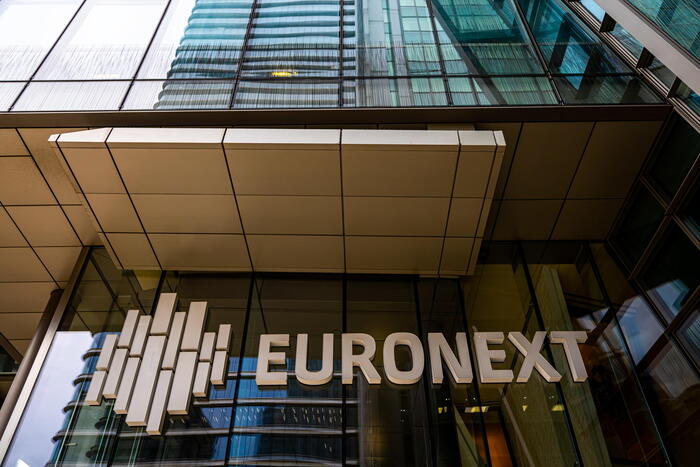Tug of war against the clock between the two largest banks in Switzerland.
According to the
Financial Times
, UBS has offered this Sunday 1,000 million dollars (about 930 million euros) for the purchase of its rival, Credit Suisse, plunged into a deep crisis that has brought the price of its shares to record lows this week and It has generated a wave of mistrust among its clients, deposit withdrawal included.
The amount is well below the more than 7,000 million euros in which Credit Suisse was valued at the close of the session on Friday.
And it means offering only 0.25 francs per title, compared to the current 1.86 francs.
That disparity, according to
Bloomberg,
it would have caused an initial rejection of the offer by Credit Suisse and its main shareholder, the Saudi National Bank (SNB), who consider it insufficient.
The Saudi bank attended the capital increase at the end of last year, putting $1.5 billion on the table for Credit Suisse in exchange for 9.9% of the shares.
There were those who compared that step with the 5,000 million that the famous investor Warren Buffett put in Goldman Sachs in 2008, which he would later recover with juicy profits.
When it opted to invest in Credit Suisse, the bank seemed to have bottomed out or at least was close to bottoming out, but time has belied that idea, and the SNB has racked up huge losses, in excess of $500 million, in just four months, so that presses for the purchase price to be higher.
After spending the wild card of a powerful injection of liquidity by the Swiss National Bank, which has proven insufficient to calm the waters, the Swiss authorities are now betting on the absorption of Credit Suisse by UBS as the lesser evil.
The solution involves competition problems, and would probably entail thousands of dismissals due to overlapping, but it would prevent the bank from ending up in foreign hands, and above all, it seems the simplest at a time when time is running against.
Anything short of arriving at the market opening on Monday with a solution would be reckless, because the reports that speak of daily deposit withdrawals of more than 10,000 million at the end of last week, in the midst of a deep crisis of confidence, are gasoline for the markets.
And reversing that trend in the midst of a tidal wave of negative news seems like an impossible mission.
In this scenario, UBS occupies a position of strength in the negotiation.
It must decide to what extent it is willing to take the risk of acquiring the most troubled bank in Europe, with a long history of scandals in the last five years, many of them pending in court, which means that the reputational and legal expenses will continue. breeding for years.
That without counting possible deaths in the closet yet to come out.
For this reason, UBS is demanding government guarantees worth 6,000 million dollars, according to Reuters, and will try to tighten the rope to obtain the best possible conditions.
The crisis of its biggest rival may seem a priori good news for UBS, one of the main destinations for clients frightened by Credit Suisse's drift.
But its fall, although it would leave the ground free to dominate the Swiss market, also entails risks for UBS: the prestige and credibility of Swiss banks would take time to recover.
And their shares would not escape the stock market earthquake that would devastate the sector.
More information
Credit Suisse, the decline of a symbol of financial power
If the operation fails, a plan B gains ground. Putting Credit Suisse on the market without a solution on Monday would be something similar to throwing it to the lions, and would cause immediate contagion to the rest of the Stock Markets, especially to European banks.
For this reason, according to
Bloomberg
, the Swiss state considers total or partial nationalization as a last resort.
There are precedents.
In 2008, when the financial crisis broke out, Switzerland had to come to the rescue precisely from UBS, highly exposed to US subprime mortgages. At that time, it injected 6 billion francs into the bank and kept its portfolio of toxic assets.
The move worked out for him: the Confederation earned almost 800 million euros by selling its share package a year later.
The vice president of the Swiss Socialists and deputy, Samuel Bendahan, already pointed to this possibility in an interview with this newspaper.
"If this gets worse, it must be the State that enters the capital of Credit Suisse," he opined this Thursday.
Marc Chesney, a finance professor at the University of Zurich, believes that if the state nationalizes Credit Suisse, you have to be very demanding with the bank.
“If it is rescued with public money, the shareholders would have to assume losses, the directors would have to be removed and a thorough investigation of what has happened would be carried out.
The taxpayer cannot be the one who pays”.
Before you get to that point, the UBS option is still on the table.
If sealed, the deal would create a new European banking giant.
UBS had 1.1 trillion in assets at the end of 2022, and Credit Suisse with 574,000 million.
The operation, although it transcends borders and requires the approval of several regulators, will also mark the future of the Swiss financial system, which accounts for around 9% of GDP.
That is why the Swiss government itself is participating in the talks.
The Swiss Executive is willing to allow UBS to skip some rules so that the merger between the two largest entities in the country can become a reality as soon as possible.
Specifically, the government would put in place emergency measures so that UBS could ignore the obligation to give a six-week consultation period to shareholders.
The speed at which events happen is frantic.
Discussions are accelerating just two days after the Swiss National Bank agreed to grant Credit Suisse loans of up to 50 billion euros.
The public bailout was initially seen by investors as a powerful lifeline that would keep the bank afloat in the short term.
The movement became necessary after its main shareholder, the Saudi National Bank, threw a jug of cold water by announcing that it would no longer contribute more funds, thus giving rise to a collapse in the Stock Market.
Its titles recovered a good part of the ground lost in the session on Thursday, the day the injection of liquidity from the central bank was known, but the doubts did not take long to return, and the new blow to the action this Friday, of 8%,









